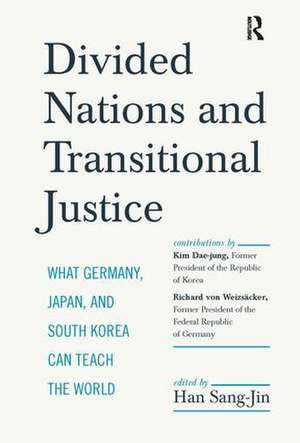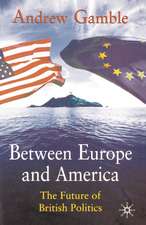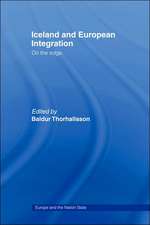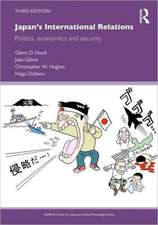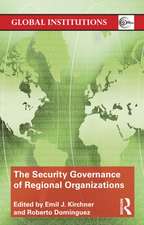Divided Nations and Transitional Justice: What Germany, Japan and South Korea Can Teach the World
Autor Sang-Jin Han, Kim Dae-Jung, Richard Von Weizsaeckeren Limba Engleză Paperback – 30 iul 2014
| Toate formatele și edițiile | Preț | Express |
|---|---|---|
| Paperback (1) | 322.89 lei 6-8 săpt. | |
| Taylor & Francis – 30 iul 2014 | 322.89 lei 6-8 săpt. | |
| Hardback (1) | 1328.55 lei 6-8 săpt. | |
| Taylor & Francis – 30 mar 2012 | 1328.55 lei 6-8 săpt. |
Preț: 322.89 lei
Preț vechi: 431.28 lei
-25% Nou
Puncte Express: 484
Preț estimativ în valută:
61.78€ • 67.32$ • 52.06£
61.78€ • 67.32$ • 52.06£
Carte tipărită la comandă
Livrare economică 23 aprilie-07 mai
Preluare comenzi: 021 569.72.76
Specificații
ISBN-13: 9781594519017
ISBN-10: 1594519013
Pagini: 272
Dimensiuni: 152 x 229 x 14 mm
Greutate: 0.39 kg
Ediția:1
Editura: Taylor & Francis
Colecția Routledge
Locul publicării:Oxford, United Kingdom
ISBN-10: 1594519013
Pagini: 272
Dimensiuni: 152 x 229 x 14 mm
Greutate: 0.39 kg
Ediția:1
Editura: Taylor & Francis
Colecția Routledge
Locul publicării:Oxford, United Kingdom
Recenzii
“This timely book shows how two great presidential former leaders, Kim Dae-Jung (1925–2009) of Korea and Richard von Weizsäcker (1920– ) of Germany coped with the historic legacies of their countries on the basis of firm personal moral principles and despite being subject to institutional constraints and pressures from both inside and outside.”
—Political Studies Review
—Political Studies Review
Cuprins
Chapter 1 Divided Nation, Unification and Transitional Justice: Why Do We Need a Communicative Approach?, Han Sang-Jin; Chapter 2 Three Objectives of Transitional Justice Today, Claus Offe; Part 1 Two Presidents on Peace and Unification of Divided Nations; Chapter 3 Ardent Dream of Divided Countries: Germany and Korea, KimDae-jung; Chapter 4 Willy Brandt’s Ostpolitik and the Sunshine Policy: What Can the Koreas Learn?, KimDae-jung; Chapter 5 Reflections on the End of the War That Divided Germany, R.von Weizsäcker; Chapter 6 Power of Dialogue for Peace, KimDae-jung; Chapter 7 Beyond Divided Nations: Reflection on Ostpolitik and Sunshine Policy, R.von Weizsäcker; Chapter 8 Four Conditions of Global Peace on the Korean Peninsula, KimDae-jung; Chapter 9 Reflection on Reconciliation Approaches in South Korea, KimDae-jung; Chapter 10 The Historical Summit Meeting 2000: A Dawn of Hope Is Breaking, KimDae-jung; Chapter 11 Toward Peace on the Korean Peninsula, KimDae-jung; Chapter 12 German Unification and Korean Dream: Six Days with Kim Dae-jung in Berlin, HanSang-Jin; Part 2 Two Presidents on Transitional Justice and Reconciliation; Chapter 13 Germany and Japan 50 Years after the End of Their Imperial Ambitions, R. von Weizsäcker; Chapter 14 Germany, Europe, and Japan at the Beginning of the 21st Century: Lessons, Chances, and Challenges, R. von Weizsäcker; Chapter 15 Memory of War and Reconciliation in Europe: Interview with Asahi Shimbun, R. von Weizsäcker; Chapter 16 Toward a New Relation with Japan: Future Possibilities, Kim Dae-jung; Chapter 17 Resolving to Build a New Partnership: Joint Declaration on a New ROK-Japan Partnership for the 21st Century, Kim Dae-jung, Obuchi Keizo; Chapter 18 The Joint Resolution: Ten Years Later, Kim Dae-jung; Part 3 Can Japan Learn from Germany? Toward a Trustful Japan with Global Leadership; Chapter 19 How to Remember the Nazi Crimes? The German Compensation of Forced Labor, Martin Salm; Chapter 20 Overcoming the Past? The Postwar Japan and Germany, Yuji Ishida; Chapter 21 Japan’s Pathway to Imperial Power, Ito Narihiko; Chapter 22 Japan’s Unresolved Colonial Past and the North Korea Problem, Gavan McCormack; Chapter 23 Can Japan Overcome the Ghost of the Past? A Communicative Approach, Han Sang-Jin; Part 4 The Younger Generation Takes Its Stand; Chapter 24 Global Standard of Human Rights and “Comfort Women”, Kim Jongdae; Chapter 25 A Chinese Perspective: No More Excuses for Japan, Chu Tsz Kwan; Chapter 26 A Southeast Asian Perspective: Why Is a Genuine Apology So Important?, Yvonne Chee Huisan; Chapter 27 Why Do Filipinos Remember the Past in Their Own Way?, Park Sae-Seul; Chapter 28 The History Textbook Controversy and Its Solution, Lee Soo-Yun; Chapter 29 Japan’s Dogeza and an Apology Consensus, Lim Yei-Won; Chapter 30 A Trial of Failures: A Deeper Look into the Tokyo Trials, LeeYae-Rim; Chapter 31 Germany Is Still a Model for Japan to Follow, Lee Shan-Hoo; Chapter 32 Transitional Justice on the Atomic Bombing of Hiroshima, Shin Hyun-Seung; Chapter 33 Reconciliation Triangle, Kim Keon-Woong; Part 5 Conclusion; Chapter 34 Reflexive Modernization and the Future of East Asia, Han Sang-Jin;
Notă biografică
Kim Dae-jung, Richard von Weizsäcker, Han Sang-Jin
Descriere
Divided Nations and Transitional Justice is a collection of significant writings contributed by the late president Kim Dae-jung of the Republic of Korea and former president Richard von Weizsaecker of Germany.
